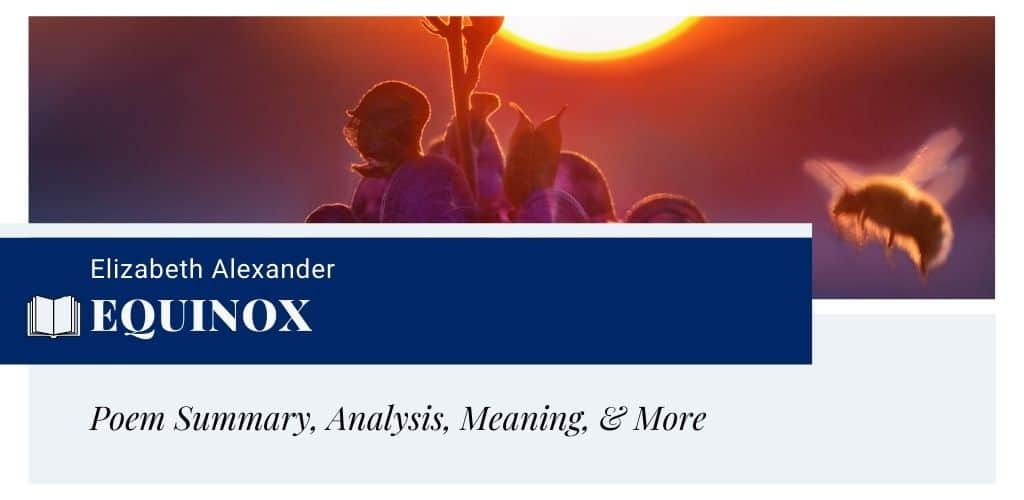Equinox by Elizabeth Alexander
Elizabeth Alexander’s poem “Equinox” metaphorically explores the themes of old-age, death, and life. The most important fact regarding this poem is that it speaks interestingly of the bees and their activities during late September. It is the month of autumn when flowers are less, honey is scarce, and bees are tired of their long journey of protecting and feeding themselves. The season of fall is in itself a lethargic part of the year when the bees become rash and defensive. The same goes for us, the human beings when old age comes nearby. In the speaker’s case, her grandmother is the one who starkly resembles the bees of autumn.
- Read the full text of “Equinox“

Summary
The poem “Equinox” begins with a reference to the bees. Alexander’s poetic persona describes how the bees react wildly during the autumn. Due to lack of food at this time of year, bees weaken and wait for chilling winter days. The speaker says only a drop of honey or stinging can take their lives.
The speaker compares them to her grandmother who had a stroke again. Her grandmother is in a similar state and she is going to die soon. Her reaction also resembled that of the dying bees. By the end of the poem, the speaker talks about how they are aware of the fact that she is going to die in the near future.
Meaning
The title of the poem “Equinox” is an interesting metaphor that can only be understood after reading the whole text. An equinox occurs when Earth’s equator passes through the geometric center of the Sun’s disk. It is the moment when the Sun shines directly above the equator. In each year, it occurs around 20 March (northward equinox) and 23 September (southward equinox).
From the perspective of this poem, readers have to focus on the September equinox which is also called the autumnal or fall equinox. It is a critical time of the year as it prepares the plot for the chilling winter. In this poem, autumn is portrayed as old-age that makes one aware of impending death. Through the reference of the speaker’s grandmother, she reiterates Shelley’s idea in “Ode to the West Wind”: if the autumnal equinox comes, can winter be far behind? (The actual line: “If Winter comes, can Spring be far behind?)
Structure & Form
This poem is written in free-verse. It does not contain a specific rhyme scheme or meter. Alexander uses the lyric style, first-person point of view in the text. Readers can find a few instances of slant rhymes in the first stanza. For example, the words “wild” and “compared” imperfect. Apart from that, the following stanzas do not contain such instances of rhyming. Regarding the meter, it consists of a mixed-use of iambic-trochaic meter with a few variations. There are a few examples of internal rhymings that readers can find in some lines.
Poetic Devices & Figurative Language
Alexander’s poem “Equinox” contains the following poetic devices which include:
- Metaphor: The title of the poem is a metaphor of old age, a critical time in a person’s life. Besides, there is an implied comparison between the “bee” and the speaker’s grandmother.
- Alliteration: It occurs in the following examples: “fly fast,” “loop-de-loops,” “clusters of conversants,” “she stood,” etc.
- Enjambment: It occurs throughout the poem. For example, the following lines are enjambed to create a flow: “Now is the time of year when bees are wild/ and eccentric.”
- Personification: The poet personifies the dying bees as “dervishes”.
- Anticipation: There is anticipation concerning the speaker’s grandmother’s death in the last few lines.
Line-by-Line Analysis & Explanation
Lines 1-5
Now is the time of year …
… dried husks in my clothes.
The first stanza of “Equinox” refers to a particular season in which bees react wildly. Alexander’s speaker captures the change in their behavior by using the term “eccentric” that applies to human beings. It is a personification.
Why does a bee show such instinct this month? To answer this question, we have to know what month it is.
The following lines (2-4) describe how they fly at that time to throw light on their behavior. According to the speaker, their flight becomes faster. They fly in “loop-de-loops”. It means they fly in a circular motion. The way of their flying highlights their frustration and confusion.
In this particular line, the poet uses the term “cramped” which is connected to muscular pain. When people grow older, muscle cramp occurs often. From this reference, it becomes clear that the poet is implying something related to old age.
The poet metaphorically describes them as “dive-bomb clusters of conversants”. The first term “dive-bomb” describes how the bees dive like aerial bombs. While the second reference is meant for describing how they work in clusters. They are conversant in what they do.
The last part of the fourth line “late-September out-of-doors” refers to the time of the year talked about in the poem. The Northern hemisphere observes Autumn in the last week of September. So, during this season, the bees become wild and act like eccentrics due to scarcity of food and their impending death. Interestingly, the speaker has found the signs of it in the “dried husks” in her clothes.
Lines 6-10
They are dervishes because …
… reared back and slapped
From the previous stanza, it becomes clear that the main theme of this piece is old age and impending death. The poet also implies the theme of change by referring to autumn.
In this stanza, her speaker compares the bees to Muslim dervishes who were noted for their wild or ecstatic rituals. The bees act like them as they are about to die. In this way, she highlights a few signs of old age such as wildness, eccentricity, frustration, and unmindful behavior.
Furthermore, the speaker says it is a matter of “one last sting”. It just needs to squeeze the venomous sting into a “warm place”, a metaphorical reference to our skin. At this point of the year, they become so desperate for honey that one drop of it can take away their lives. Here, the “honey” is compared to salvation that the dervishes badly sought after. One drop of it could incite ecstasy or lunacy.
In the following lines, the poet uses a digression or shift in the subject matter. From the bees, she now zooms in her sick grandmother’s image. She had a stroke recently. She had suffered a few cerebral attacks previously. It made the speaker realize that the recent one would be her last.
However, her grandmother miraculously dodged death and reared back. Like the dying bees of autumn, she showed wildness and eccentricity in her behavior. The speaker further describes it in the following lines.
Lines 11-15
a nurse across the face. …
… and she is breathing.
After the recent attack, she showed her frustration towards the nurse and slapped her across the face. She did not mean to do that. Eccentric behavior is one of the signs of old age. The following line describes it better.
According to the speaker, after being stable, her grandmother headed straight outside and laid down in the snow. However, two years passed after the event. Still, she is alive. It is quite miraculous.
The speaker’s family is waiting for the moment when she leaves her earthly burden and quickly fades away into nothingness. Only death could relieve her from the pain she is suffering. She remains silent. Yet, her silence is more powerful than the words can convey. Her stillness and inability to speak are caused by internal deterioration of both the brain and the body.
In the last line, Alexander uses a beautiful simile to compare her body to a hive. The bees are the lifeline of a hive. Without their presence in winter, it turns into an abandoned desert. Similarly, when the speaker looks at her grandmother, it feels like she is turned into a hive. She has lost her speech, ability to move, and think. Without such signs of life, she is nothing but a body empty of life. Only the slow ups and distressing downs of her breath are there that keep them waiting till the last hour.
Historical Background
Elizabeth Alexander’s poem “Equinox” was published in her second poetry collection Body of Life. It was first published in 1996. In the same year, she wrote the verse play Diva Studies which was staged at Yale University. In this collection of poetry, Elizabeth Alexander’s poems fuse personal and family experiences with larger historical explorations. According to the Washington Post Book World, it is a book of “graceful elegance and easy musicality.” In this particular poem “Equinox,” Alexander talks about her grandmother who was about to die, and compares her to the eccentric bees of autumn.
Questions & Answers
The poem “Equinox” was first published in 1996 in Elizabeth Alexander’s second book of poetry, Body of Life.
The poem is about the poet’s old grandmother who had a stroke recently and lost all signs of liveliness. Alexander compares her to the bees that turn wild and eccentric when autumn arrives. The bees behave in this manner as they are about to die.
Through this piece, Alexander describes the changes in a person when he or she grows older. The moment when a person loses her ability to think, speak, or walk, it makes them frustrated. This frustration is depicted by the images of wild bees in autumn. This critical point of one’s life makes them seem like an empty hive without any signs of life.
It is a lyric poem that is written in free verse. The poet uses the first-person point of view while narrating her thoughts in this poem.
The speaker of this piece is none other than the poet Elizabeth Alexander. She speaks through her lyrical persona and describes how her ailing grandmother resembles the bees which are about to die in the winter.
Similar Poems about Old Age & Autumn
- “To a Poor Old Woman” by William Carlos Williams – It’s about a poor old woman savoring the rich taste of ripe plums with all her senses.
- “Death the Leveller” by James Shirley – This poem is about the egalitarian nature of death.
- “My Mother at Sixty-Six” by Kamala Das – This poem describes how a speaker leaves her aging mother behind.
- “Something Told the Wild Geese” by Rachel Field – It’s about the autumn season, which reminds the wild geese of the approaching winter.
External Resources
- The Poem Aloud — Listen to the poem recorded at the Chancellors Reading, Poets Forum 2015.
- About Elizabeth Alexander — Read more about the poet’s biography and her works.
- Elizabeth Alexander’s Poet Profile and Poems — Explore Alexander’s best-known poems and her short biographical sketch.
- Poet Natasha Trethewey Interviews Elizabeth Alexander — Read the full interview to know more about the themes of her works and her views on her poetry.
- Words That Shimmer, an Interview with Elizabeth Alexander — Read the interview of the poet sharing her insights on what role poetry plays in hard and complicated times.

